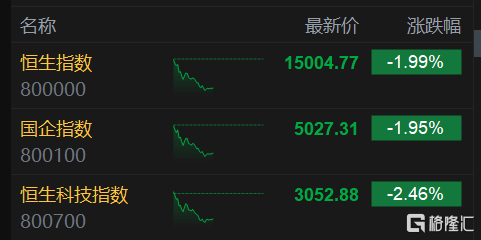Gelong Exchange on January 22? the three major indexes of Hong Kong stocks opened high and low in the morning, all the industry sectors fell, and the market mood was very depressed. By midday, both the Hang Seng Index and the National Index were down nearly 2%. At one point, the Hang Seng Index fell below 15000 points, and the Hang Seng Science and Technology Index fell 2.46%.

On the market, the collective decline of large-scale technology stocks is obvious. Meituan is down 5%, Baidu is down more than 3%, Tencent, NetEase, JD.com and Alibaba are all down; big financial stocks (banks, insurance, brokerages) have fallen one after another. China Galaxy and China International Capital Corporation led the decline; in December last year, the sales prices of commercial housing in all cities declined month-on-month, and internal housing stocks and property management stocks declined significantly, with Greentown China and China Resources Land leading the decline. The domestic catering industry returned to the stage of stock competition, with catering stocks falling, while Apple concept stocks, gold stocks, military stocks, mobile games stocks, automobile stocks and Hong Kong local stocks fell one after another. On the other hand, some home appliance stocks rose, Hisense household appliances rose by more than 2% against the trend, penny stocks were again active against the trend, nearly 50 stocks rose by more than 5%, and Huaxing Holdings resumed trading by more than 68%.
Plate aspect
Inner housing stocks and property management stocks fell across the board. "No interest rate cut"! China's 1-year and 5-year LPR remained unchanged in January. It is expected that as favorable policies continue to export and ferment, market confidence will gradually recover, and prices are expected to improve. It is expected that new and second-hand housing prices will continue to decline in the first month of 2024, but the decline is likely to narrow.

Food and beverage stocks generally fell. Minsheng Securities pointed out that the domestic catering industry returned to the stock competition stage within the year, and the mass consumption demand increased. We expect this consumption pattern to continue in 24 years; focusing on the future development, we believe that one-person food consumption, cost-effective consumption and emotional value consumption are the key points for brand boosting heat and sustainable growth. Shanxi Securities said that in 2024, it is expected that more catering enterprises will start the secondary growth curve by going out to sea; mass consumption at low customer unit price is still the mainstream, and local catering brands actively seek large-scale development under the circumstances of industry recovery and intensified market competition.

Individual stocks
Zhongbao new materials plunged 53% to a new low, the second day in a row, after rising 480% in the previous four months. It is worth noting that the company's share price rose from about HK $0.5 in September last year to HK $2.93 on January 11 this year, the biggest cumulative increase of 480 per cent in four months. Zhongbao New Materials is mainly engaged in the development and manufacture of biodegradable plastic products in Northeast China.

At one point, Haifeng International fell more than 4%, and its profit in 2023 is expected to fall by about 73% from a year earlier. Haifeng International Holdings expects unaudited profits to be about $530 million for the year ended December 31, 2023, down about 73 per cent from the previous year. In that year, container volume was 3.2 million TEUs, down about 1% from the previous year, while the average freight was US $623 TEUs, a decrease of about 43% compared with the previous year.

Hisense home appliances rose more than 2% against the trend and continued to buy back shares. On Friday, January 19, 2024, the company spent 28.16 million yuan to buy back 1.15 million A shares at a repurchase price of 23.9-24.7 yuan per share.




